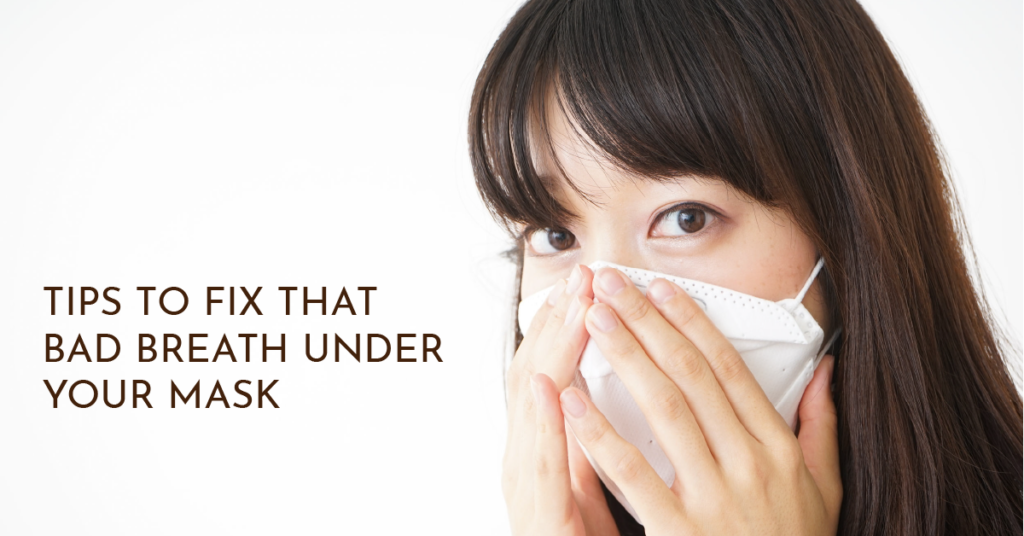
The coronavirus pandemic has made all of us used to wearing a mask before stepping out of the house. And for some of you, you may start to realise that there is a funny odour underneath your mask. Well, it is not the mask that is causing you bad breath. Wearing a mask just makes you more aware about the fact that you have bad breath. Imagine cupping your hands over your mouth to test your breath, it has the same effect.
Halitosis, more commonly known as bad breath, is caused by odour-producing bacteria that is present on our teeth and tongue. It can be a temporal issue for some, while others may struggle with it on a daily basis.
Temporary bad breath can occur due to our diet, such as after having a meal that contained garlics, or consuming beverages such as alcohol and coffee. While chronic (or persistent) bad breath signals the presence of other dental and/or medical issues.
Before you decide to pop a mint to conceal your bad breath, here are some tips on what you can do about your bad breath, and what you should avoid doing to prevent further occurrence of bad breath.
What can I do about my bad breath?
1) Step up on personal oral care practices
It is essential to brush your teeth with a fluoridated toothpaste two times a day, for at least two minutes each time. Remember to brush your tongue and gums gently as well. This will help to reduce the number of bacteria in your mouth.
Brushing after meals is encouraged, however if that is not possible, rinsing your mouth with a non-alcohol mouthrinse will help too.
Flossing is another important part of oral care that should be done at least once a day to remove plaque in between your teeth.
2) Drink more water throughout the day
Frequent consumption of water (yes, it has to be plain water) helps to stimulate saliva production. Saliva plays an important role in our dental health as well as fighting of bad breath. It helps to break down food when we eat, remove unwanted leftovers from our mouth and produce bacteria-fighting substances to prevent cavities and infections.
When we have less saliva, our breath will tend to smell. You may observe that you have a morning breath when you wake up in the morning. This is due to there being a decrease in saliva production during the night. Brushing your teeth and drinking water to keep your mouth moist will generally remove the morning breath.
A dental issue that hampers the production of saliva will be dry mouth (xerostomia). Persistent bad breath is one of the symptoms of dry mouth. Drinking water would not be sufficient to treat this condition. Hence, if you suspect that you are suffering from this condition, you are recommended to visit your dentist / dental specialist for professional help. More information on treatment of xerostomia can be found here.
3) Visit your dentist / dental specialist regularly
Most cases of bad breath is caused by dental issues such as cavities and gum disease. Visiting your dentist / dental specialist regularly every six months will allow these dental issues to be picked up early and treated promptly. This will prevent them from developing into more serious dental conditions that require extensive and more costly treatment.
If it is found that the reason for your bad breath may be due to medical conditions such as gastric reflux, diabetes, liver or kidney disease, a referral to an appropriate medical doctor would be made.
During your dental visit, in addition to a thorough dental examination, a professional cleaning session (scaling and polishing) with your dentist / dental specialist will be carried out too. This is the only way to remove hardened plaque (tartar) on your teeth. Tartar causes small openings (pockets) in between your teeth and gums, allowing food, bacteria and plaque to collect and produce a strong odour.
What should I not do to prevent bad breath?
A) Smoke or chew tobacco
Chemicals (e.g. tar, nicotine) from cigarettes build up in your mouth when you smoke. They stick onto your teeth, gums, tongue and inner cheeks to produce an odour. The hot air not only dries out your mouth and saliva, encouraging the growth of certain odour-producing bacteria. It also causes oral tissue cells that protect the mouth to be damaged.
Tobacco chewing, which is illegal in Singapore, has similar effects on the ecosystem of our mouth.
By quitting the butt, you are taking the first step towards better breath and better dental health.
B) High sugar diet
The bacteria in our mouth loves sugar. It interacts with sugar to release acids and volatile sulfuric compounds that causes an odour. Therefore, reduce sugary foods in your diet, especially sticky sweets like caramel and gummies. If you must eat them, have them together with your main meal (and not as a snack) so that your extra saliva (from chewing) will help wash it away.
C) Overconsumption of alcohol
Alcohol dries out the mouth. Be it wine, beer, cocktails or champagne, research has shown that the higher the alcohol consumption is, the more likely one is going to get bad bacteria in the mouth, while killing off the good bacteria.
The key is to drink in moderation and drink plenty of water during the process.





